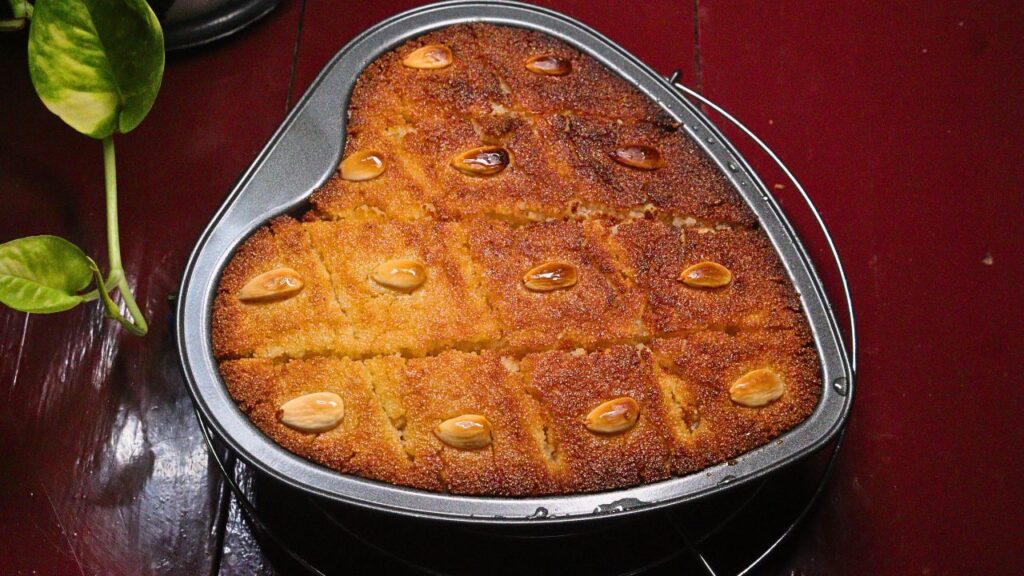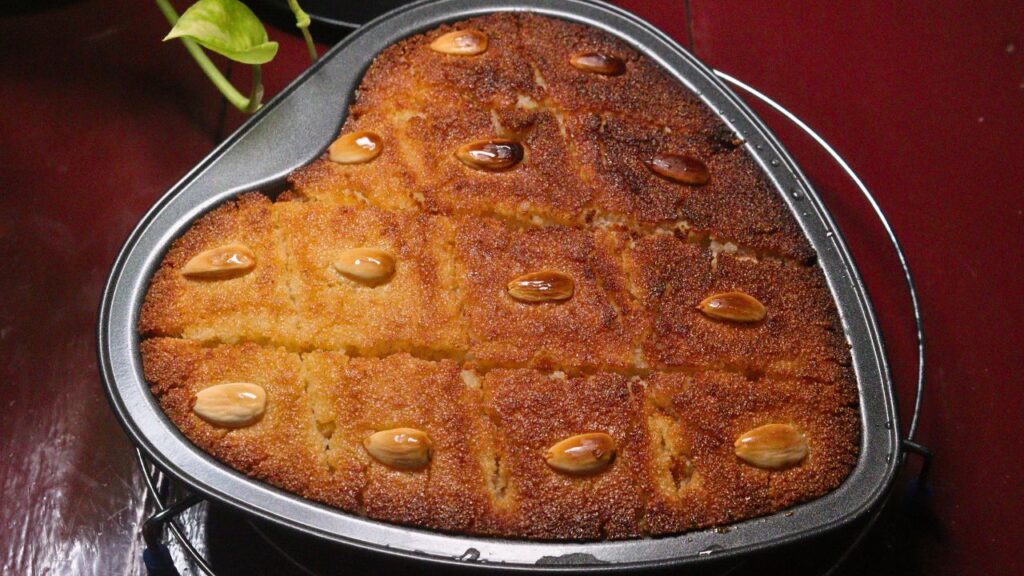



Basbousa is a beloved Arabic dessert that has been enjoyed for centuries across the Middle East and North Africa. This semolina cake is known for its rich texture, delicate sweetness, and the unique way it absorbs fragrant sugar syrup, making every bite moist and flavorful. Whether served during festive occasions or as a comforting homemade treat, eggless basbousa is a staple in Middle Eastern households. The simplicity of ingredients and the ease of preparation make it a go-to dessert for anyone craving a taste of tradition.
This Middle Eastern dessert stands out due to its unique combination of coarse semolina cake and coconut, which gives it a slightly grainy yet soft texture. Unlike conventional cakes, this dessert is eggless, making it an excellent choice for vegetarians and those with dietary restrictions. The batter is enriched with butter and milk, ensuring a rich flavor and a tender crumb. Once baked to golden brown perfection, the cake is soaked in a warm sugar syrup infused with lemon and rose essence, enhancing its depth of flavor and making it irresistibly moist.

This dessert is deeply rooted in Middle Eastern and Mediterranean cuisine, with variations found across different cultures. In Egypt, it is widely enjoyed during religious and family gatherings. In Turkey, a similar dessert known as "Revani" features the same semolina base but is sometimes flavored with orange zest. Greek and Lebanese versions also exist, each with subtle differences in texture and syrup composition. Despite its regional adaptations, the essence of this dessert remains unchanged—a simple, syrup-soaked semolina cake that captures the heart of those who taste it.
One of the main reasons eggless basbousa is so popular is its ability to stay fresh and moist for days. The sugar syrup is a natural preservative, preventing the cake from drying. Additionally, it requires minimal ingredients, making it an accessible recipe for both novice and experienced bakers. Using semolina instead of all-purpose flour gives it a distinctive texture that is slightly dense yet tender.
This Dessert is incredibly versatile. It can be customized by adding almonds, pistachios, or even a drizzle of condensed milk for extra richness. Some variations incorporate yogurt instead of milk, resulting in a denser texture. Regardless of the modifications, the fundamental appeal of this Middle Eastern dessert remains—sweet, aromatic, and utterly delicious.
Though traditional basbousa consists of semolina, coconut, and sugar syrup, many variations introduce exciting flavors:
Each of these variations adds a unique touch while maintaining the traditional essence of this Arabic dessert.
The syrup is what truly sets this dessert apart from other cakes. Unlike dry cakes that require frosting or fillings, this semolina cake relies on sugar syrup to achieve its perfect balance of sweetness and moisture. The syrup is usually made by simmering sugar, water, and lemon juice together. Some recipes include rose or orange blossom water for an extra layer of fragrance.
Timing is crucial when adding syrup to the cake. The cake should be warm when the syrup is poured over it, allowing it to absorb evenly. If the syrup is too hot, it may cause the cake to become overly soft; if it’s too cold, it won’t penetrate the cake properly. Getting this step right ensures a moist yet firm texture that melts in your mouth.
To achieve the best results, follow these tips:
The dessert is best enjoyed warm or at room temperature. It pairs beautifully with:
For festive occasions, garnish with crushed pistachios, dried rose petals, or a drizzle of condensed milk to enhance its visual appeal and flavor.
While Basbousa has been a staple in traditional Middle Eastern households, it has also gained popularity worldwide. With the rise of social media, bakers and chefs are experimenting with new flavors and presentations. Some modern versions include layered basbousa, mini bite-sized versions, and even vegan alternatives using almond milk and coconut oil. The adaptability of this Arabic dessert makes it a favorite for both traditional and contemporary palates.

Basbousa is more than just a Middle Eastern dessert—it is a timeless delicacy that brings warmth and nostalgia with every bite. Its simple ingredients, rich texture, and sweet, fragrant syrup make it an irresistible treat. Whether you stick to the classic version or try out a creative twist, eggless basbousa is a dessert that never fails to impress. Perfect for celebrations, gatherings, or simply indulging in a comforting homemade treat, basbousa continues to be a cherished favorite across cultures and generations.